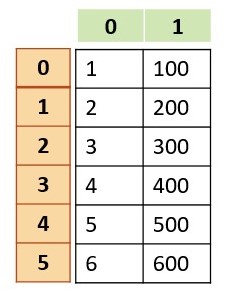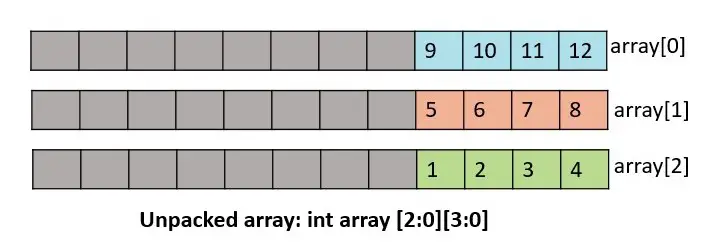SystemVerilog Arrays
An array is a group of variables having the same data type. It can be accessed using an index value.
An index is a memory address and the array value is stored at that address.
Types of an array
- Fixed-size array in SystemVerilog
- Single dimensional array
- Multidimensional array
a. Two-dimensional array.
b. Three-dimensional array - Packed and Unpacked array in SystemVerilog
- Dynamic array in SystemVerilog
- Associative array in SystemVerilog
Fixed-size array in SystemVerilog
Array size is fixed throughout the simulation. Its value will be initialized with a ‘0’ value.
Single dimensional array
int arr [3];
int arr [2:0];
Array assignment
int arr[3] = '{5,6,7}; // Declaration, and assignment
Or
int arr[3];
arr[0] = 5;
arr[1] = 6;
arr[2] = 7;Multidimensional array
A multidimensional array is also known as an array of an array. In mathematics, we studied matrix, this can be understood as a multidimensional matrix.
Two-dimensional array

int array[6][2] = '{'{1, 100}, '{2, 200}, '{3, 300}, '{4,400}, '{5, 500}, '{6, 600}}; // Declaration and assignment
int arr[6][2]; // Declaration
arr[0][0] = 1; // Assignment
arr[0][1] = 100;
arr[1][0] = 2;
arr[1][1] = 200;
arr[2][0] = 3;
arr[2][1] = 300;
arr[3][0] = 4;
arr[3][1] = 400;
arr[4][0] = 5;
arr[4][1] = 500;
arr[5][0] = 6;
arr[5][1] = 600;Example:
module foreach_example;
int array[6][2] = '{'{1, 100}, '{2, 200}, '{3, 300}, '{4,400}, '{5, 500}, '{6, 600}};
initial begin
foreach (array[i,j]) begin
$display("array[%0d][%0d] = %0d", i,j, array[i][j]);
end
end
endmoduleOutput:
array[0][0] = 1
array[0][1] = 100
array[1][0] = 2
array[1][1] = 200
array[2][0] = 3
array[2][1] = 300
array[3][0] = 4
array[3][1] = 400
array[4][0] = 5
array[4][1] = 500
array[5][0] = 6
array[5][1] = 600Three-dimensional array
int array[3][3][3] = '{'{'{1, 10, 100}, '{2, 20, 200}, '{3, 30, 300}},
'{'{4, 40, 400}, '{5, 50, 500}, '{6, 60, 600}},
'{'{7, 70, 700}, '{8, 80, 800}, '{9, 90, 900}}
};
Example:
module foreach_example;
int array[3][3][3] = '{'{'{1, 10, 100}, '{2, 20, 200}, '{3, 30, 300}},
'{'{4, 40, 400}, '{5, 50, 500}, '{6, 60, 600}},
'{'{7, 70, 700}, '{8, 80, 800}, '{9, 90, 900}}
};
initial begin
foreach (array[i,j, k]) begin
$display("array[%0d][%0d][%0d] = %0d", i,j, k, array[i][j][k]);
end
end
endmoduleOutput:
array[0][0][0] = 1
array[0][0][1] = 10
array[0][0][2] = 100
array[0][1][0] = 2
array[0][1][1] = 20
array[0][1][2] = 200
array[0][2][0] = 3
array[0][2][1] = 30
array[0][2][2] = 300
array[1][0][0] = 4
array[1][0][1] = 40
array[1][0][2] = 400
array[1][1][0] = 5
array[1][1][1] = 50
array[1][1][2] = 500
array[1][2][0] = 6
array[1][2][1] = 60
array[1][2][2] = 600
array[2][0][0] = 7
array[2][0][1] = 70
array[2][0][2] = 700
array[2][1][0] = 8
array[2][1][1] = 80
array[2][1][2] = 800
array[2][2][0] = 9
array[2][2][1] = 90
array[2][2][2] = 900Scalar Vs Vector
Scalar
The data object which does not have a specific range for bit/logic/reg is a scalar.
logic var1;
bit var2;
Vector
The data object which has a specific range for bit/logic/reg is a vector.
logic [5:0] var1;
bit [2:0] var2;Packed and Unpacked array
Packed array
A packed array refers to the dimension mentioned before the variable or object name. This is also known as the vector width.
Memory allocation is always a continuous set of information that is accessed by an array index.
reg [5:0] array; // [5:0] is packed dimension or vector width.
bit [2:0][3:0] array;
Unpacked array
An unpacked array refers to the dimension mentioned after the variable or object name.
Memory allocation may or may not be a continuous set of information.
reg arr [3:0]; // [3:0] is unpacked dimension.
int array [2:0][3:0];
Example:
module array_example;
int array [2:0][3:0] = '{'{1, 2, 3, 4},
'{5, 6, 7, 8},
'{9, 10, 11, 12}
};
initial begin
foreach (array[i,j]) begin
$display("array[%0d][%0d] = %0d", i, j, array[i][j]);
end
end
endmoduleOutput:
array[2][3] = 1
array[2][2] = 2
array[2][1] = 3
array[2][0] = 4
array[1][3] = 5
array[1][2] = 6
array[1][1] = 7
array[1][0] = 8
array[0][3] = 9
array[0][2] = 10
array[0][1] = 11
array[0][0] = 12Combination of a packed and unpacked array
All arrays mentioned above are types of static arrays.
Example:
module array_example;
bit [4:0] array[2:0][1:0] = '{'{5'h5, 5'h1},
'{5'h10, 5'h2},
'{5'h15, 5'h3}
};
initial begin
foreach (array[i,j]) begin
$display("array[%0h][%0h] = %0h", i, j, array[i][j]);
end
end
endmoduleOutput:
array[2][1] = 5
array[2][0] = 1
array[1][1] = 10
array[1][0] = 2
array[0][1] = 15
array[0][0] = 3System Verilog Tutorials